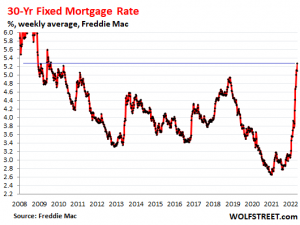Albert Einstein called compound interest the ‘most powerful force in the universe’. Mortgage interest is like its opposite — a black hole that sucks in more and more money as it grows*.
Scroll down for a chart that let’s you map your mortgage payment increase against higher rates. For now, here’s some shorthand:
If you’re renewing in the next few years and have a sizable mortgage, then breaking your current mortgage and locking in at today’s rates might save you a considerable amount of money.
Let’s look at the numbers and present some scenarios. First, some background.
Rates Inflate
Alarmed by the inflation that has pumped up gas and is gouging us at the grocer, the US Federal Reserve announced its largest fed rate increase in 20 years. US mortgage rates were already at 20-year highs before that announcement. The Bank of Canada has indicated that they are on the same path. Rates have jumped 2% in the last year alone.
Bottom line: mortgage rates are going up and will continue to do so for the next few years. Small rate bumps aren’t a big deal when we’re at historic lows. They don’t impact small mortgages very much. But as the chart below shows, continuous increases get pretty painful, pretty quickly.
What you’ll pay as rates climb
Map your own mortgage against this chart to get a sense of what you’ll pay as rates increase.
| Mortgage Remaining | 2% | 3% | 4% | 5% |
|---|---|---|---|---|
| $500k | $1846 | $2103 | $2377 | $2668 |
| $1M | $3692 | $4206 | $4755 | $5383 |
| $1.5M | $5538 | $6309 | $7121 | $8005 |
In short, if you’re carrying a large mortgage, higher rates will become very burdensome. The average Toronto homeowner owes 600,000+, most of it being mortgage debt. Million dollar mortgages are not uncommon.
What to do
If you’re renewing in 2 years or less and have a mortgage that already presses on your finances, you should look at how much it will cost to ‘break’ your mortgage now and lock in at a current rate versus how much more you’ll pay if you don’t.
Here’s a scenario using a million-dollar mortgage:
Idra and Felix owe $1,000,000 on a mortgage that renews in 2 years. They have a 2.79% fixed rate, and currently pay $4200. If they lock in at a 4% fixed rate now for 5 years, they will increase their payment by $500 for two years, which costs them an extra $12k per year, plus they’ll pay a 3 month interest charge for breaking their mortgage. For simplicity’s sake we’ll say that’s $7000
If rates go up to 6% by the time they have to renew, they’d save $12k per year for 5 years (60k), less two years of what they’d save by not breaking. That’s
60k-25k = 29k in savings and five years of better sleep.
How much is 5 years of not worrying about interest rates worth to you?
If rates hit 7% in year 4, they save an extra $12k.
Could rates hit 7%? Yes.
What does breaking a mortgage entail?
Most mortgages can be broken and the penalty for doing so is spelled out in your Terms and Conditions.
You are not restricted to renewing with your current bank or lender. In fact, if your situation has changed, it might be better to change your lender to suit it. This is particularly important if this new lender allows you to pay your mortgage down faster, either by paying extra every month or by lump sum every year. If you have a large mortgage, paying it down aggressively before rates rise will save thousands of dollars. In fact, paying your mortgage down aggressively can save you tens of thousands of dollars. Check to make sure your mortgage terms and budget allow it.
A housing correction would drop property values
While no great correction is imminent, early indicators are that the torrid pace of housing price appreciation has stopped and sales have slowed. We may be teetering at the top of value mountain. We may not.
If prices do drop, then it will affect your refinancing (not renewal) options.
What if interest rates go down?
It isn’t likely that they will in a timeframe that would affect a future, second renewal. Central banks are still tabling years of rate hikes (the US Fed has laid out 10 more hikes). Even if inflation is tamed, it would take a steep recession for central banks to take action and lower rates quickly.
If you’re locked-in to a low rate and have a manageable mortgage
Breaking your mortgage to guard against higher rates doesn’t make as much sense for you. Your best course of action is to pay your mortgage down as aggressively as possible. At renewal, the lower principal will offset the increased interest rates and the cash-flow change may be negligible.
So, uhh, now what?
Interest rates have been dropping since the 1990s. They dropped as we weathered the 1999 tech bubble and the 2008 financial crisis. Now, the liquidity-creating and rate-dropping actions of central banks and governments during the Covid years, along with supply-chain crunches and corporate profiteering have combined to bring us sustained, record-setting inflation.
To be honest, the causes of this inflation may not have been driven by these decisions and/or environmental factors at all, but the effect is here and higher rates are how the powers that be are addressing it.
Are rates and inflation here to stay? Who knows. I do know that if you renew a sizeable mortgage at very high rates, you’ll face a significantly higher monthly payment. Einstein was awed at how compound interest accrued over time. You’ll be awed at how distorted your payments become if rates keep rising.
Please reach out if you want to discuss your specific situation.



[…] By Trevor Stafford Interest Rates Real Estate June 21, 2022 […]